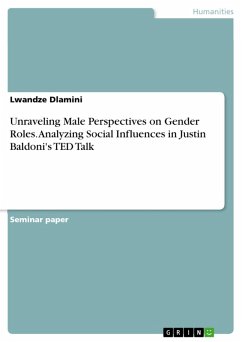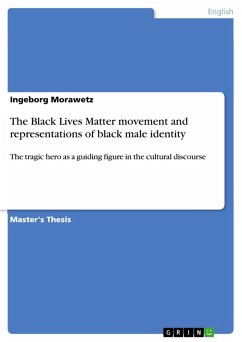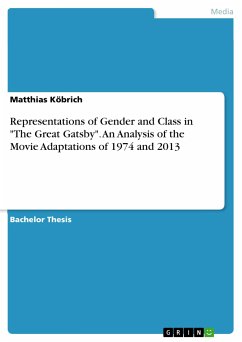
Unraveling Male Perspectives on Gender Roles. Analyzing Social Influences in Justin Baldoni's TED Talk (eBook, PDF)
Sofort per Download lieferbar
Statt: 18,95 €**
15,99 €
inkl. MwSt. und vom Verlag festgesetzt.
**Preis der gedruckten Ausgabe (Broschiertes Buch)
Alle Infos zum eBook verschenkenWeitere Ausgaben:

PAYBACK Punkte
0 °P sammeln!
Seminar paper from the year 2021 in the subject Gender Studies, grade: 5.0, , course: Social and developmental psychology, language: English, abstract: This study delves into the examination of how males contemplate social influences and perceive assigned roles of masculinity and femininity. Employing a qualitative research design and adopting a social constructionism epistemological approach, we analyzed the transcribed script of Justin Baldoni's TED talk using a reflexive thematic approach. The findings revealed that a male child tends to positively identify with in-group behavior when there...
Seminar paper from the year 2021 in the subject Gender Studies, grade: 5.0, , course: Social and developmental psychology, language: English, abstract: This study delves into the examination of how males contemplate social influences and perceive assigned roles of masculinity and femininity. Employing a qualitative research design and adopting a social constructionism epistemological approach, we analyzed the transcribed script of Justin Baldoni's TED talk using a reflexive thematic approach. The findings revealed that a male child tends to positively identify with in-group behavior when there are perceived benefits, while negative identification occurs if such behavior is deemed illegitimate, unstable, or harmful through self-introspection. Additionally, the study suggests that a male child's understanding of sex-role stereotypes and preferences for sex-appropriate or inappropriate behavior are subtly ingrained by society at a young age. The data further endorse the applicability of a gender schematic approach to sex-role socialization and advocate for integrating the concepts of positive and negative social group identification into the social identity theory.
Dieser Download kann aus rechtlichen Gründen nur mit Rechnungsadresse in A, B, BG, CY, CZ, D, DK, EW, E, FIN, F, GR, HR, H, IRL, I, LT, L, LR, M, NL, PL, P, R, S, SLO, SK ausgeliefert werden.













